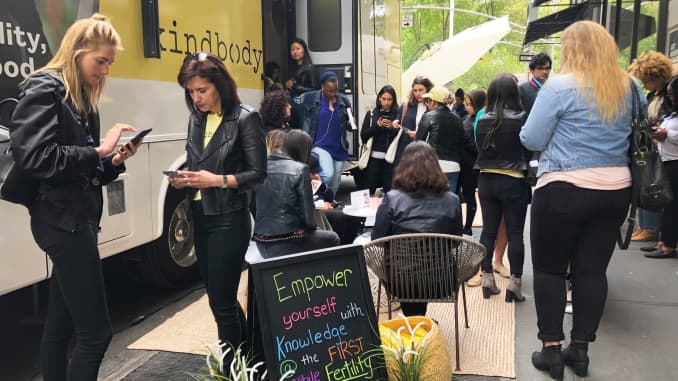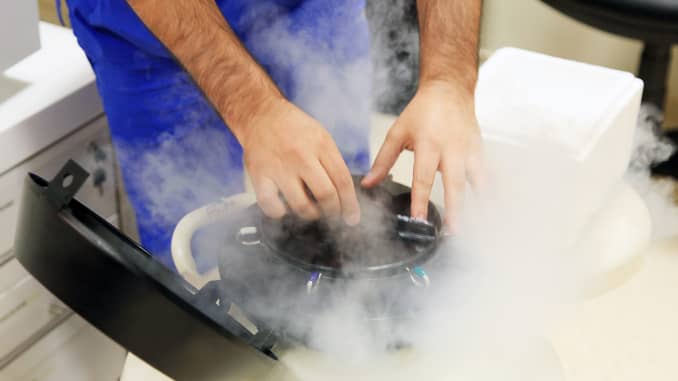Egg freezing has become the go-to for delayed parenthood – and companies are popping up to provide more cost-effective solutions
By Seema Mody & Harriet Taylor
As millennial women enter their 30s, demand for customized and affordable egg freezing services is spiking.
The biggest question women have? How to pay for it.
On average, women spend $15,000 to $20,000 per cycle and opt for two cycles, according to Fertility IQ, a digital database for information about fertility benefits and treatments.
Marika Frumes, 35, is among the growing number of millennial women opting to freeze their eggs, and now organizes events to educate others.

The KindBody mobile clinic pictured here in New York City is heading to San Francisco in June. Harriet Taylor | CNBC
“This comes up all the time — more in hush-hush corners — because I think women are uncomfortable sharing the fact that maybe they can’t pay for something,” said Fumes, president and CEO of the HER Network. “And who can? It’s $15,000 — in New York.”
As women delay motherhood and take their time in finding the right partner, fertility experts see egg freezing becoming more popular. The average age of women getting this procedure done has gone down to 35 in 2018, from 38 in 2016.
The Society for Reproductive Technology says 10,936 women froze their eggs in 2017 and the market is projected to grow 25% annually over the next two years, according to Fertility IQ.
New entrant Kindbody hosts pop-up clinics and events to target millennial women who are considering their options.
“There are more women who are single professionals with disposable income who are now pursuing egg freezing in the U.S.,” Gina Bartasi, CEO of Kindbody, told CNBC. “It’s estimated that the total market is about $4.3 billion for egg freezing and $2.7 billion for IVF.”
Startups such as Kindbody know how to market their services to millennial women via social media, and are successfully demystifying the conversation, removing the stigma and increasing accessibility, said Frumes.
“Social media is information and awareness, and once something pops in your screen enough times and then you hear it from a friend, you’re going to say ‘wow, wait what is this?’” she said. “And then you might start Googling and then you might start asking more questions.”
Many health plans won’t cover
Unfortunately, most health-care plans don’t cover the procedure if it is considered elective, leaving many women in a tough position. There are just 30 companies in the Fortune 500 that offer benefits which cover egg freezing, according to Fertility IQ.
Among those with the most generous benefits, tech is leading the way. Facebook, Uber, and Pinterest each cover up to four cycles while Alphabet, Microsoft, and AT&T each cover three cycles, according to CNBC’s reporting and Fertility IQ.
Facebook – whose fertility benefits are administered by Progyny – added the benefit in response to employee demand. It opted to cover four cycles versus a lump sum to allow patients and doctors to make treatment decisions based on what’s likely to have the best outcome – more healthy babies, said Renee Albert, Facebook’s benefits director.
“In the old style of how fertility benefits were set up, we often saw fewer healthy babies and more in the NICU,” she said. “We get better outcomes at a better cost because we’re having healthy babies.”
Analysts say covering fertility treatments is one way to retain talent and lower attrition rates as more women climb the corporate ladder. Also on the rise is sperm freezing coverage for male employees concerned about their fertility future.
Boston-based start-up Legacy provides men the option to freeze their sperm.
“It is less popular than the egg freezing, but we do have males who have taken advantage of it for various reasons,” said Albert.
Women who spoke to CNBC at a Kindbody event in New York said finding a company that offers these type of benefits could drive their decision making on whether they would want to stay at their current employer or make a switch to a different company that had better health-care coverage.
Loans become popular
Bartasi says Kindbody’s investment in technology means it can offer more cost-effective services – one cycle plus one year of storage costs $6,000. Medication and blood work can cost up to an additional $5,000. Women seeking further storage can expect to pay an additional $600 per year.
Loans have also become popular among women.
Kindbody currently offers zero interest rate loans to patients.
Kendall Bassard, a therapist with two Ivy League degrees, found that her health-care coverage did not include egg freezing. Kindbody worked with her to figure out a repayment plan that would fit her budget, said Bassard.

“I felt that they were meeting me where the reality of my finances were,” said Bassard.
A number of financial companies, including LendingClub and Prosper, offer women personal loans which can be used to cover fertility procedures such as egg freezing. The average personal loan for LendingClub is $15,895 with an average APR of 10.65%. Prosper’s average personal loan is $14,000 and an average APR of 17%.
Private equity backed IntegraMed is also targeting millennials — with a boutique-style urban New York clinic that offers a stylish waiting area with a juice bar, video-streaming services in the blood drawing room and easy financing options through LendingClub.
Interest from venture capital

In February, Extend Fertility – which has one clinic in New York and plans to expand to the West Coast — announced it raised $15 million in a Series A funding from private equity firm Regal Healthcare Capital Partners. In a funding round led by Aspect Ventures, San Francisco-based Future Family announced it raised $10 million in its Series A in October.
“There’s certainly a lot of interest from private equity in the fertility space in general and certainly some of the more disruptive companies,” TJ Farnsworth, CEO of Inception, told CNBC.
“As things like fertility preservation become more popular, far more known across the country, across patient mixes … we’re going to see an even faster growth rate than we’re seeing today,” added Farnsworth. In March, private equity-backed Inception teamed up with the Prelude network, which has facilities across the U.S.
Yet some medical experts warn that startups, while innovative and appealing, have a limited track record for success.
“It’s easy to freeze eggs, but it’s harder to thaw these eggs, add sperm, make embryos and get someone pregnant,” said Dr. Zaher Merhi at the New Hope Fertility Center.
More Press
Kindbody’s Dr. Fahimeh Sasan on The Hendy Show
In this episode, Amanda welcomes Dr. Fahimeh Sasan, Founding Physician & Chief Innovation Officer at Kindbody. You’ll learn the ins and outs of fertility treatment, from the emotional to practical.
Dr. Erica Louden on Chicago Tonight
Dr. Erica Louden (Kindbody Chicago) weighs in on the controversial IVF ruling in Alabama.